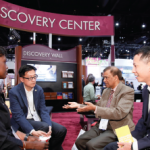 Early this year, the ACR was awarded an innovation grant from the American Society of Association Executives (ASAE) for a proposal designed to engage its members about health disparities among patients with rheumatic diseases.1 The program’s first phase will focus on creating plans to diminish racial and ethnic disparities for those patients.
Early this year, the ACR was awarded an innovation grant from the American Society of Association Executives (ASAE) for a proposal designed to engage its members about health disparities among patients with rheumatic diseases.1 The program’s first phase will focus on creating plans to diminish racial and ethnic disparities for those patients.
The goal of ASAE’s Innovation Grants Program, which began funding ideas in 2013, is to “provide awards to support creative exploration and project development that will raise the association community’s awareness of and engagement with innovative ideas and projects,” according to the ASAE website. The program is supported by SunTrust Foundation, GEICO and law firm Whiteford, Taylor & Preston. The ACR was one of five 2018 winners. The others are the Association of College and University Housing Officers—International, the BBB Wise Giving Alliance, the International Association of Fairs and Expositions and the National Association of School Nurses.
The ACR’s $10,000 grant will fund a new program: Uniting Collaborators for Innovation (UCOIN). The initiative’s goal is to reduce disparities by serving as “a career development incubator for members,” according to grant application documents. Rheumatologist S. Sam Lim, MD, MPH, ACR’s UCOIN Working Group chair, says that one of the first steps in addressing disparities is to encourage rheumatologists to pursue potentially innovative ideas.
“Throughout their training, healthcare professionals gain the knowledge and skills to become capable clinicians, researchers and academicians,” says Dr. Lim, professor of medicine in the Division of Rheumatology at Emory University School of Medicine, Atlanta. “But learning how to build a career—to adeptly navigate day-to-day realities, be confident, become expert in the subject matter of a field—takes more. Therefore, an additional and external place where rheumatology professionals with common interests [can] get support … [enables] an important opportunity for growth.”
And the timing for this opportunity may never have been more important, he says.
Increased Diversity
“The reason for this focus is that people of color in the U.S. are disproportionately affected by several rheumatic diseases,” Dr. Lim says. “Additionally, Americans are more racially and ethnically diverse than in the past, and projections show that there will not be a single racial or ethnic majority by 2055. Thus, for ACR members, the professional and societal consequences of health disparities will continue to grow.”
Dr. Lim adds that ACR membership itself will only become more diverse over time, as well—a point also noted in the 2015 ACR Workforce Study of Rheumatology Specialists in the U.S.2 To be clear, addressing the association’s diversity is not part of the scope of the grant, but engaging all ACR members on racial and ethnic disparities in patients—with a focus on minority members—may, in turn, draw more people of color to the specialty.
“Only 0.8% of ACR members who responded to the most recent ACR Workforce Study and treat adults identify as African-American,” he says. “The study authors recommended diversity of the workforce as a critical topic of concern for the ACR and an area in which the ACR should focus specific initiatives. [In addition,] millennials, and particularly millennials of color, report the desire for engagement with activities tied to a strong sense of purpose and meaning. Thus, by focusing the initial phase of UCOIN on the reduction of health disparities in rheumatic disease and appropriately communicating the intention to the community, UCOIN will support increasing diversity among the ACR membership.”
The Program
Under UCOIN, ACR members can design and implement projects that advance the mission of reducing health disparities. Dr. Lim says a tailored process will generate ideas through communication forums and marketing of the grant funding. In particular, the program will look to support ideas from younger ACR members, in part through coaching from more senior members of the specialty.3
That approach would simultaneously help develop and disseminate “innovative, problem-solving projects and products from the ideas” and normalize “innovative thinking within the ACR,” Dr. Lim says.
Dr. Lim says that rank-and-file rheumatologists should look at UCOIN as an opportunity. “Rheumatology professionals who are not connected to an academic institution or other large organization may have fewer opportunities for funding and mentoring to test their ideas,” he says. “UCOIN provides a forum for any rheumatology professional to identify a need. Moreover, they can choose to suggest, develop and/or test an idea to address the need. And they can do it with support. UCOIN has the potential to remove a real or perceived limitation for many rheumatology professionals.”
Part of the program’s approach is to help rheumatologists distinguish between those limitations.
“UCOIN will meet members where they are to present opportunities, to learn the importance of tackling these issues and [enable] opportunities to help overcome [disparities],” Dr. Lim says. “Hopefully, others will be stimulated and ignited to take risks and help design their own proposals, which they may not otherwise have done.”
Richard Quinn is a freelance writer in New Jersey.
References
- American College of Rheumatology. News release: American College of Rheumatology awarded grant to focus on projects that curb health disparities. 2018 Feb 14.
- The Academy for Academic Leadership. 2015 ACR Workforce Study of Rheumatology Specialists in the U.S. American College of Rheumatology. 2016.
- American Society of Association Executives. News release: ASAE Foundation announces five innovation grants program award recipients. 2018 Jan 9.


